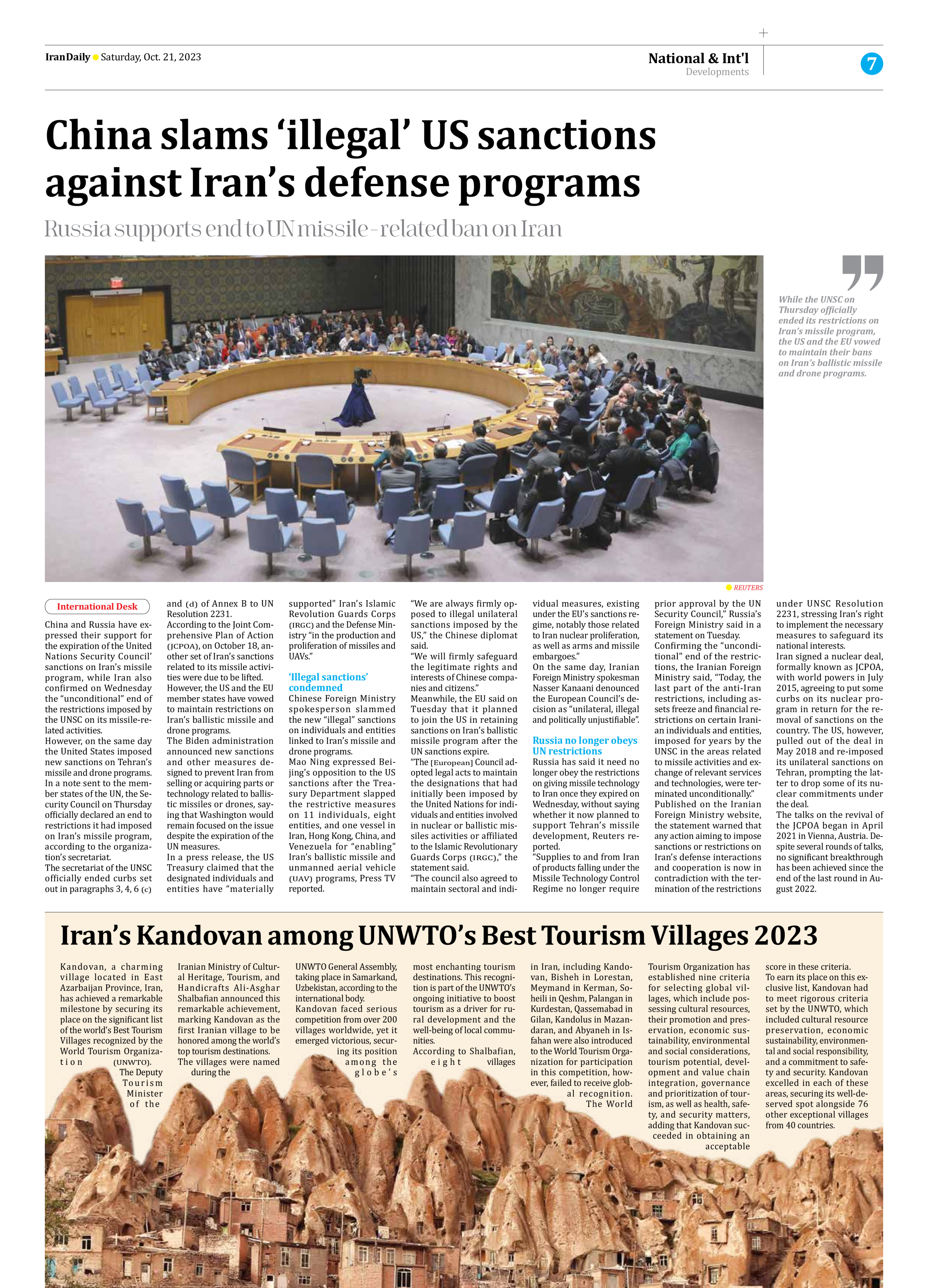
Copy in clipboard...
China slams ‘illegal’ US sanctions against Iran’s defense programs
Russia supports end to UN missile-related ban on Iran
However, on the same day the United States imposed new sanctions on Tehran’s missile and drone programs.
In a note sent to the member states of the UN, the Security Council on Thursday officially declared an end to restrictions it had imposed on Iran’s missile program, according to the organization’s secretariat.
The secretariat of the UNSC officially ended curbs set out in paragraphs 3, 4, 6 (c) and (d) of Annex B to UN Resolution 2231.
According to the Joint Comprehensive Plan of Action (JCPOA), on October 18, another set of Iran’s sanctions related to its missile activities were due to be lifted.
However, the US and the EU member states have vowed to maintain restrictions on Iran’s ballistic missile and drone programs.
The Biden administration announced new sanctions and other measures designed to prevent Iran from selling or acquiring parts or technology related to ballistic missiles or drones, saying that Washington would remain focused on the issue despite the expiration of the UN measures.
In a press release, the US Treasury claimed that the designated individuals and entities have “materially supported” Iran’s Islamic Revolution Guards Corps (IRGC) and the Defense Ministry “in the production and proliferation of missiles and UAVs.”
‘Illegal sanctions’ condemned
Chinese Foreign Ministry spokesperson slammed the new “illegal” sanctions on individuals and entities linked to Iran’s missile and drone programs.
Mao Ning expressed Beijing’s opposition to the US sanctions after the Treasury Department slapped the restrictive measures on 11 individuals, eight entities, and one vessel in Iran, Hong Kong, China, and Venezuela for “enabling” Iran’s ballistic missile and unmanned aerial vehicle (UAV) programs, Press TV
reported.
“We are always firmly opposed to illegal unilateral sanctions imposed by the US,” the Chinese diplomat said.
“We will firmly safeguard the legitimate rights and interests of Chinese companies and citizens.”
Meanwhile, the EU said on Tuesday that it planned to join the US in retaining sanctions on Iran’s ballistic missile program after the UN sanctions expire.
“The [European] Council adopted legal acts to maintain the designations that had initially been imposed by the United Nations for individuals and entities involved in nuclear or ballistic missiles activities or affiliated to the Islamic Revolutionary Guards Corps (IRGC),” the statement said.
“The council also agreed to maintain sectoral and individual measures, existing under the EU’s sanctions regime, notably those related to Iran nuclear proliferation, as well as arms and missile embargoes.”
On the same day, Iranian Foreign Ministry spokesman Nasser Kanaani denounced the European Council’s decision as “unilateral, illegal and politically unjustifiable”.
Russia no longer obeys UN restrictions
Russia has said it need no longer obey the restrictions on giving missile technology to Iran once they expired on Wednesday, without saying whether it now planned to support Tehran’s missile development, Reuters reported.
“Supplies to and from Iran of products falling under the Missile Technology Control Regime no longer require prior approval by the UN Security Council,” Russia’s Foreign Ministry said in a statement on Tuesday.
Confirming the “unconditional” end of the restrictions, the Iranian Foreign Ministry said, “Today, the last part of the anti-Iran restrictions, including assets freeze and financial restrictions on certain Iranian individuals and entities, imposed for years by the UNSC in the areas related to missile activities and exchange of relevant services and technologies, were terminated unconditionally.”
Published on the Iranian Foreign Ministry website, the statement warned that any action aiming to impose sanctions or restrictions on Iran’s defense interactions and cooperation is now in contradiction with the termination of the restrictions under UNSC Resolution 2231, stressing Iran’s right to implement the necessary measures to safeguard its national interests.
Iran signed a nuclear deal, formally known as JCPOA, with world powers in July 2015, agreeing to put some curbs on its nuclear program in return for the removal of sanctions on the country. The US, however, pulled out of the deal in May 2018 and re-imposed its unilateral sanctions on Tehran, prompting the latter to drop some of its nuclear commitments under the deal.
The talks on the revival of the JCPOA began in April 2021 in Vienna, Austria. Despite several rounds of talks, no significant breakthrough has been achieved since the end of the last round in August 2022.







